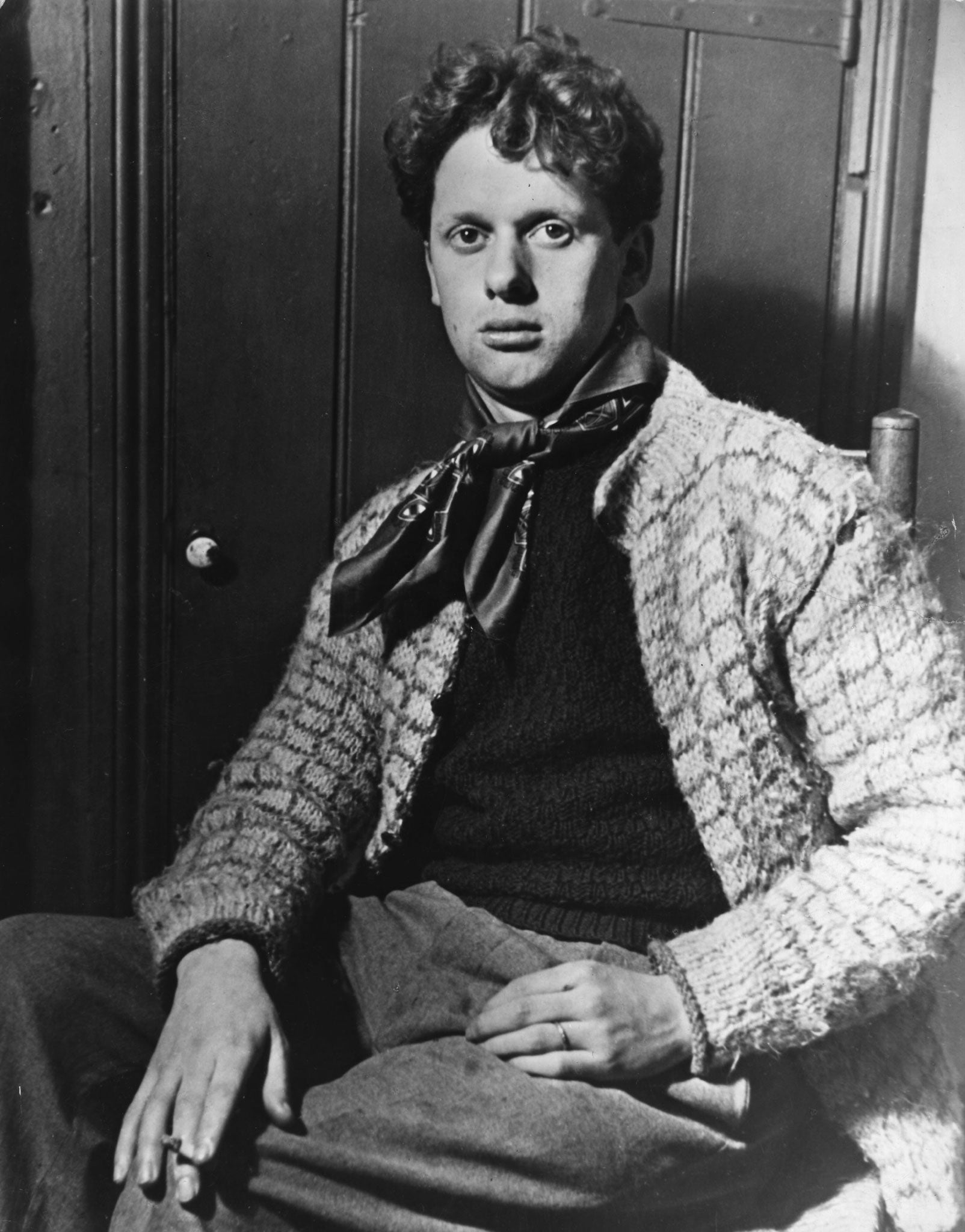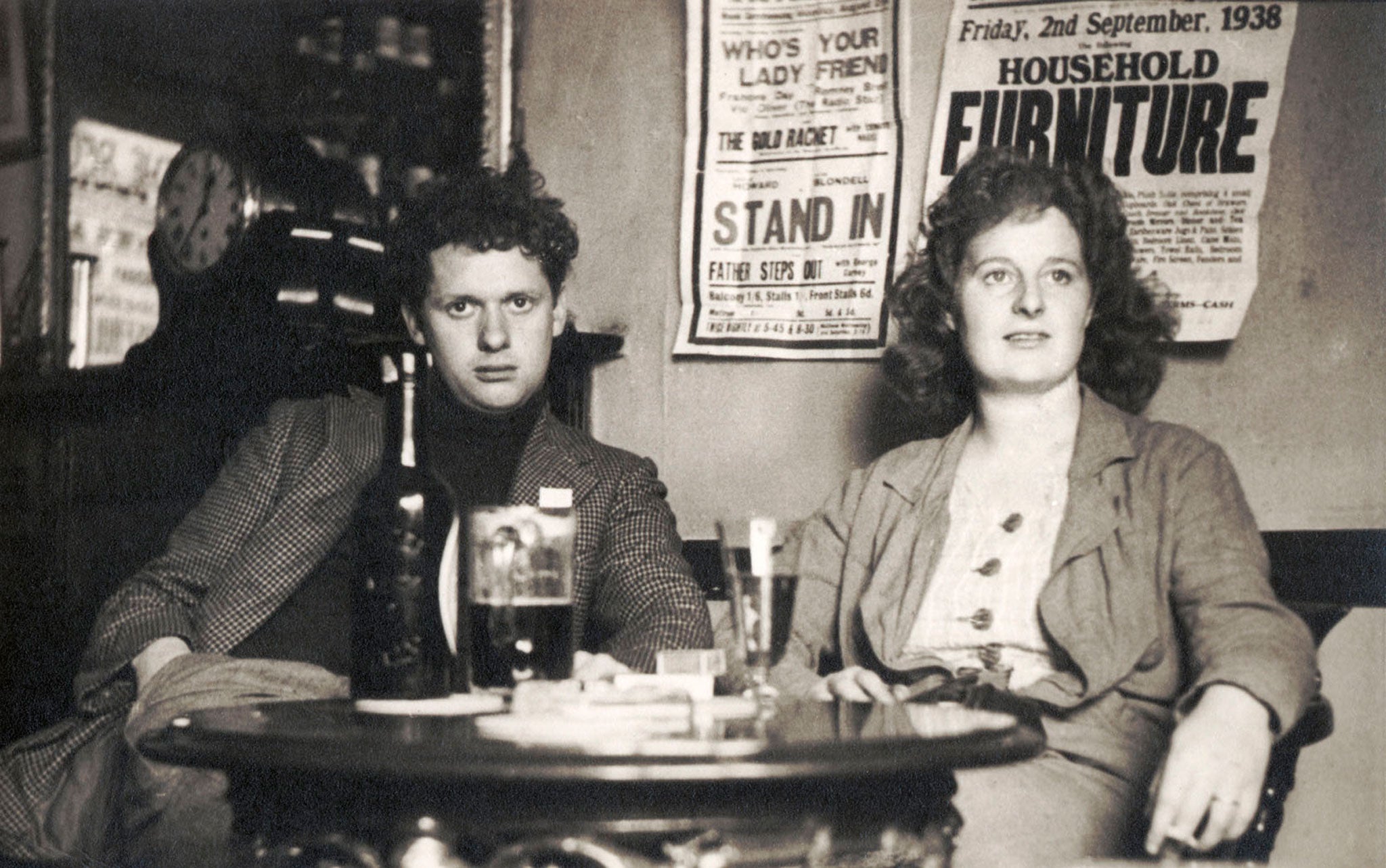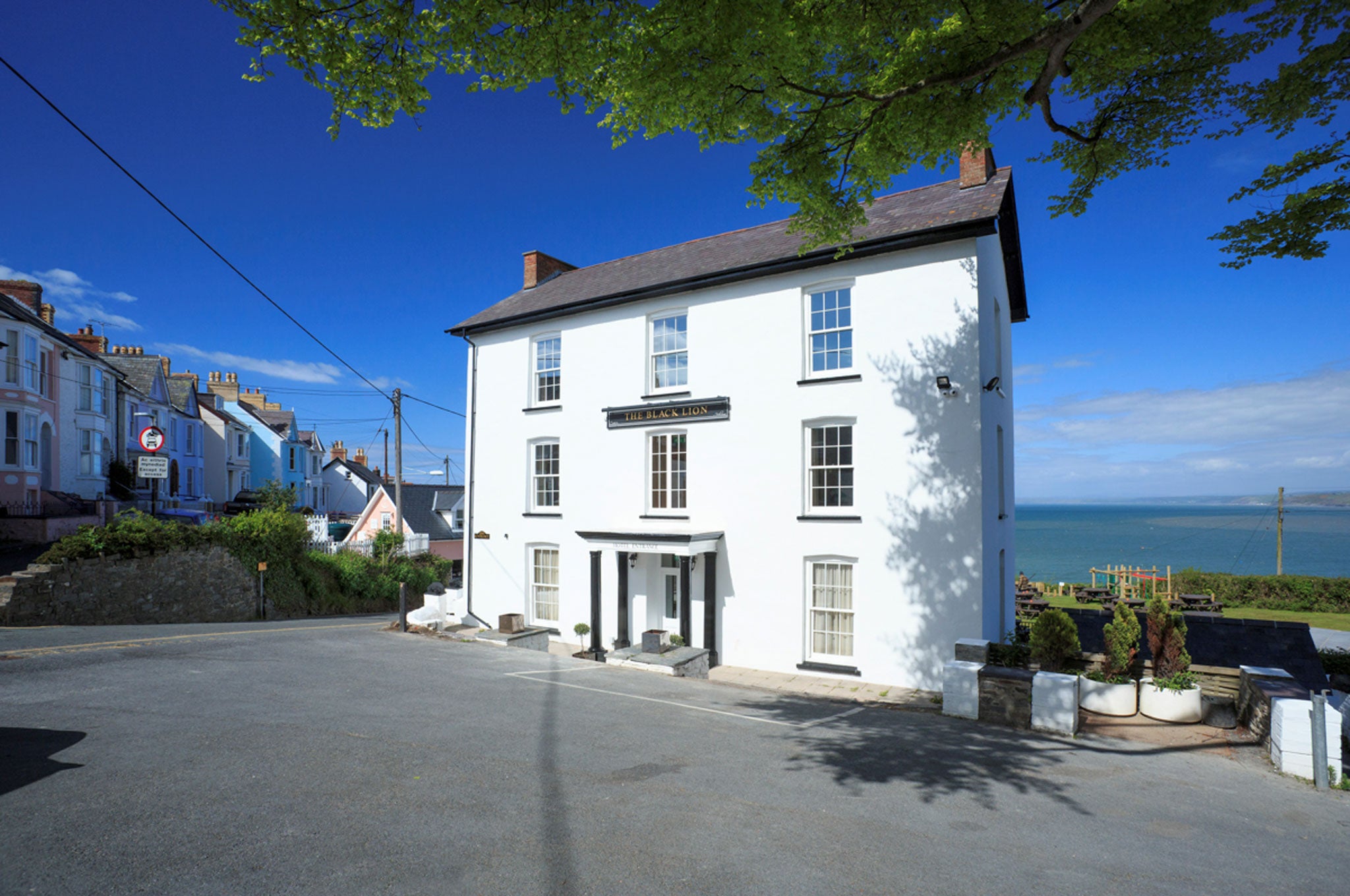A pint with Dylan Thomas: Mark the centenary of the great poet's birth with a trip around the west coast of Wales that inspired him

'People say that Dylan Thomas spent a lot of time in pubs, but I think he spent a lot of time on paths." Less breathless than me, and more used to the gradient, the poet Samantha Wynne-Rhydderch is striding up a steep, narrow track that winds towards a panoramic hill-top vista. Below us lies the little port of New Quay in Ceredigion on the west coast of Wales.
By no means "starless and bible-black" today, but bathed in rare sunshine between ferocious winter storms, the town that comes closest to Llareggub in Under Milk Wood huddles in its pastel shades around the harbour. To the north, Cardigan Bay sweeps towards Aberystwyth.
It was in New Quay that, from September 1944 until July 1945, Dylan Thomas – "Dullan" in Wales, rather than "Dillen" – lived with his wife Caitlin and two young children. The author, born in Swansea 100 years ago this October, came to these shores both to escape war-ravaged London, and to find the quiet he needed to develop a career that had moved on from much-loved poetry into film screenplays and radio scripts.
New Quay now boasts a mere five pubs rather than the 22 that hosted the fisher-folk, farmers, tradespeople and – the town's speciality – retired sea-captains of the 1940s. The poet haunted quite a few of its licensed premises, and drew inspiration from the tall tales and salty characters he met in them. The Black Lion, still a neighbourhood hub, he described as "waiting for Saturday night as an over-jolly girl waits for sailors". That was in Quite Early One Morning, the sketch of a rackety, gossipy seaside town prompted by his New Quay sojourn. It would in turn nourish Under Milk Wood. Yet Dylan at this time was not just a story-gathering, eccentric-watching barfly, but a young father who pushed his little daughter Aeronwy into town from the flimsy bungalow, called Majoda, in which the family lived.
After I demolish a robust fillet of New Quay mullet in the Hungry Trout restaurant – once the post office where Dylan would send film scripts back to London – Wynne-Rydderch plays me a taped interview with her grandmother. She remembers having seen Dylan pushing Aeronwy every day along the coastal path, and hearing the squeal and clatter of the rickety Thomas pram. One day, Wynne-Rydderch's grandfather – one of those plentiful master mariners – took up his grease-gun and repaired the offending carriage. Her other grandfather was the local GP, whose house-cum-surgery we pass on one of the handsome terraces that face across the bay in the direction of distant Snowdonia. "One night," she says, "he found himself having to patch up Caitlin when she fell over coming out of the Dolau" – a favoured nearby hostelry.
Since his death in November 1953, a few days after that fatefully boozy night at the White Horse tavern in Greenwich Village, Dylan and drink have become even more of an inseparable couple than during his all-too-brief lifetime. It might seem perverse, then, to insist that too much has been made of his fondness for the booze. According to recent research (above all by David N Thomas), medical negligence by a New York physician hastened his death, even if hard American liquor had weakened his system.
In Wales, Dylan drank beer. "Beer was to him a necessary social medium. Spirits were not," wrote his close Swansea friend Vernon Watkins. Above all, he thrived in, and profited from, pub life. In the words of the distinguished Dylanologist Jeff Towns, the pub provided "a theatre in which he could always be counted on to perform". That yarn-spinning conviviality coloured his voice and shaped his work. "People let him into their lives," says Wynne-Rhydderch. "He enjoyed talking to them, being with them, having fun." And pubs served as his gold mines, his test tracks, his echo chambers. So in this centenary year, you may with a good conscience eat, and indeed sip, your way around Dylan's beloved Wales without feeling that the pilgrimage implies any ghoulish endorsement of alcoholic excess.

My journey began in Ceredigion and then, on another storm-tossed weekend, continued in Swansea and the Gower Peninsula. Clearly, this itinerary misses out the one town that has over the years done most to promote Thomas-related tourism: Laugharne on the Carmathen coast, where Dylan and Caitlin settled in the Boathouse in 1949 and where the famous Brown's Hotel still attracts admirers from around the world. In New Quay, however, you plunge into a distinctly Welsh, and often Welsh-speaking, Wales, much closer in spirit – so locals will tell you – to the "small, decaying watering-place" painted in Under Milk Wood.
We can leave the warring camps of Dylan-ologists to fight it out. In the white-painted, light-wood-furnished bars of the revamped Black Lion, decay has been replaced by discreet good taste. Dylan memorabilia still hangs in profusion around the walls. It was here that, according to a verse letter to his friend Tommy Earp, he would "sit at the open window, observing the salty scene". Today you can eat well while contemplating that same salty scene. Among the home-made specials, I can endorse the hearty hunter's chicken and blackberry cheesecake. Of the nine smartly designed bedrooms above, some have spectacular views along the bay.
In the Black Lion, I meet local councillor Jill Hopley. She remembers pulling her first pint here – standing on a crate, in the days when Dylan's chum Jack Patrick ("Jack Pat") was still the landlord. Another New Quay fixture, the aristocratic Alastair Graham, had been a lover of Evelyn Waugh's at Oxford. He stands behind the character of Sebastian Flyte in Brideshead Revisited. Graham – whose old house, gazing k towards Snowdonia, sits amid the terraces – ran into Jill Hopley on her wedding day. "He said, 'I must give you a present you'll never forget,'" she recalls. "It was a bunch of grapes that he had grown in New Quay." Did Graham also evolve into the clock-obsessed Lord Cut-Glass in Under Milk Wood? If so, it gives him a unique double-whammy of literary legacies.
Near the Black Lion stands the Seahorse, formerly the Commercial: another pub that Dylan and friends frequented. Later in my trip, I visit the Welsh-language poet John Meirion Jones. Part of an extraordinary dynasty of bards called the Bois y Cilie, after their ancestral farm, he recalls, aged 10 in 1946, walking past the Commercial and being lured in through its saloon-style swing doors by the sounds of jazz. Inside, he saw the source of this "amazing music": Dill Jones, later a jazz star in the US, playing the piano. "There was a curly-haired man at the table next to him, and I was told that was Dylan Thomas."
The Cilie poets – who often made a living as globe-trotting skippers – wrote and write in cynghanedd. That tradition of strict-metre verse left its traces on an anglophone bard who had absorbed some of the language of his forebears from a Welsh-speaking father. And one of the Cilie poets left a more material mark on Dylan. Among Jones' uncles was the licensee of the Pentre Arms, a pub in the lovely coastal village of Llangrannog where, on a gusty winter afternoon, the sea froths outside the picture-window. Dylan came to the Pentre with a friend one night. The landlord, Jones' uncle Tom, went out back to fetch a fresh cask of ale. He returned to find the pair merrily serving themselves. Poetic genius or not, Dylan was swiftly picked up and booted out.
Dylan's career as "a pubber of genius" (the words of his schoolfriend Mervyn Levy) began in Swansea. He was born and brought up at 5 Cwmdonkin Drive in the new middle-class suburb of Uplands, perched high above the "ugly, lovely town" beside its "long and splendid curving shore". His father, DJ Thomas, a literary scholar of great promise, had settled into disappointment as an English master at Swansea Grammar School. He had bought the house for £500 in 1914, £150 borrowed from his wife Florrie's family and the rest on a mortgage.

I stay overnight in Cwmdonkin Drive, now beautifully restored to the 1920s style of Dylan's childhood thanks to a long labour of love undertaken by engineer Geoff Haden. If you look out across Swansea Bay from Dylan's parents' bedroom atop this steep hill, the poet's conceit of ships sailing across rooftops suddenly makes perfect sense. As does much else. Dylan's great elegy for DJ, "Do not go gentle into that good night", refers to "you, my father, there on the sad height". On a stormy night in early January, as the window-rattling winds howl in from the sea, 5 Cwmdonkin Drive does feel like a sad – but intensely evocative – height. I phone Geoff Haden in the morning. "Did Dylan appear?" he asks. All but. I have never visited an author's home – and Dylan wrote almost all his early verse in his tiny, narrow, cluttered bedroom – where the ghosts felt closer or more tangible.
Down the slope on Uplands Crescent, the Camra-approved Uplands Tavern bows to its best-known former patron with a cosy themed snug bar. Across the road, I dine on excellent tapas at the Verve 37 restaurant, where the wine list offers a global variety that might have astonished the 1930s tipplers of Hancock's Mild.
Back in the city centre, where Dylan pursued a brief career as a journalist on the South Wales Daily Post, other favourite bars survive. Another real-ale haven, the Queen's Hotel, once sat among a dozen other dockside pubs; now it stands alone near the new marina. In Wind Street, otherwise crammed with chain pubs and cafés, the No Sign Bar – a wine warehouse dating from 1690 – preserves a Victorian décor and a conspiratorial ambience of deep-armchaired nooks and corners. Sadly, the Swansea Blitz and post-war redevelopment have done for other haunts of choice, notably the louche hacks' dive the Three Lamps, which stars in some atmospheric Thomas tales.
Along the broad bay in Mumbles, favourite destination for a day's boozy jaunt, the Mermaid Hotel that hosted some of Dylan's finest bar-propping dialogue has become a restaurant. Mumbles no longer has its "mile" of pubs, but plenty survive along the shore: the George, the White Rose, the Waterloo, the Pilot… At Patrick's, a stylish seafront restaurant with rooms above, you can eat and drink at a level of sophistication that Dylan would never have hoped to encounter here. From a menu rich in local fish and meat, I can recommend the warm Swansea smoked salmon and the melting hake fillet with kale.
Beyond Mumbles stretch the gloriously indented bays and beaches of the Gower Peninsula, scoured on the day I visit by gales worthy of a Viking saga. The Worm's Head, which juts out beyond the three-mile sandy curve of Rhossili Bay at the far tip of the peninsula, owes its name to the Norse word for dragon. Today its "humped and serpentine body" noses out into storm-lashed waves. Dylan would regularly come here with friends; it supplies the brilliantly observed backdrop to one of his finest stories, "Who do you wish was with us?" The Worm's Head Hotel – whose 1930s landlord Dylan knew – still stands on the buffeted headland to refresh the wind-blown traveller. Close by, with equally dramatic views across the "very long golden beach" of Rhossili, is the Bay Bistro. Here, the well-made vegetarian specials hint at another drastic shift of taste since the poet's youth.
The food – and the drink – may have changed, but not the superb land- and seascapes that nurtured Dylan's writing career. And many of the snugs and saloons that gave him refuge and stimulus still stand, too. His centenary year, marked by events, performances and exhibitions across the principality, should help us retire the liquid legend and replace it with the portrait of a poet whose sociability fed and watered his art.
Across the street from his home lies Cwmdonkin Park, where indelible childhood adventures took place and enduring images took root. "The ball I threw while playing in the park," ends one early poem, "has not yet reached the ground." Follow Dylan through Wales, and you may still catch that ball in flight.
Events in Wales for the centenary are listed at dylanthomas100.org. Boyd Tonkin travelled to Wales with the support of discoverceredigion.co.uk and visitswanseabay.com. For the Black Lion: blacklionnewquay.co.uk. For Cwmdonkin Drive: dylanthomasbirthplace.com
Join our commenting forum
Join thought-provoking conversations, follow other Independent readers and see their replies
Comments
Bookmark popover
Removed from bookmarks